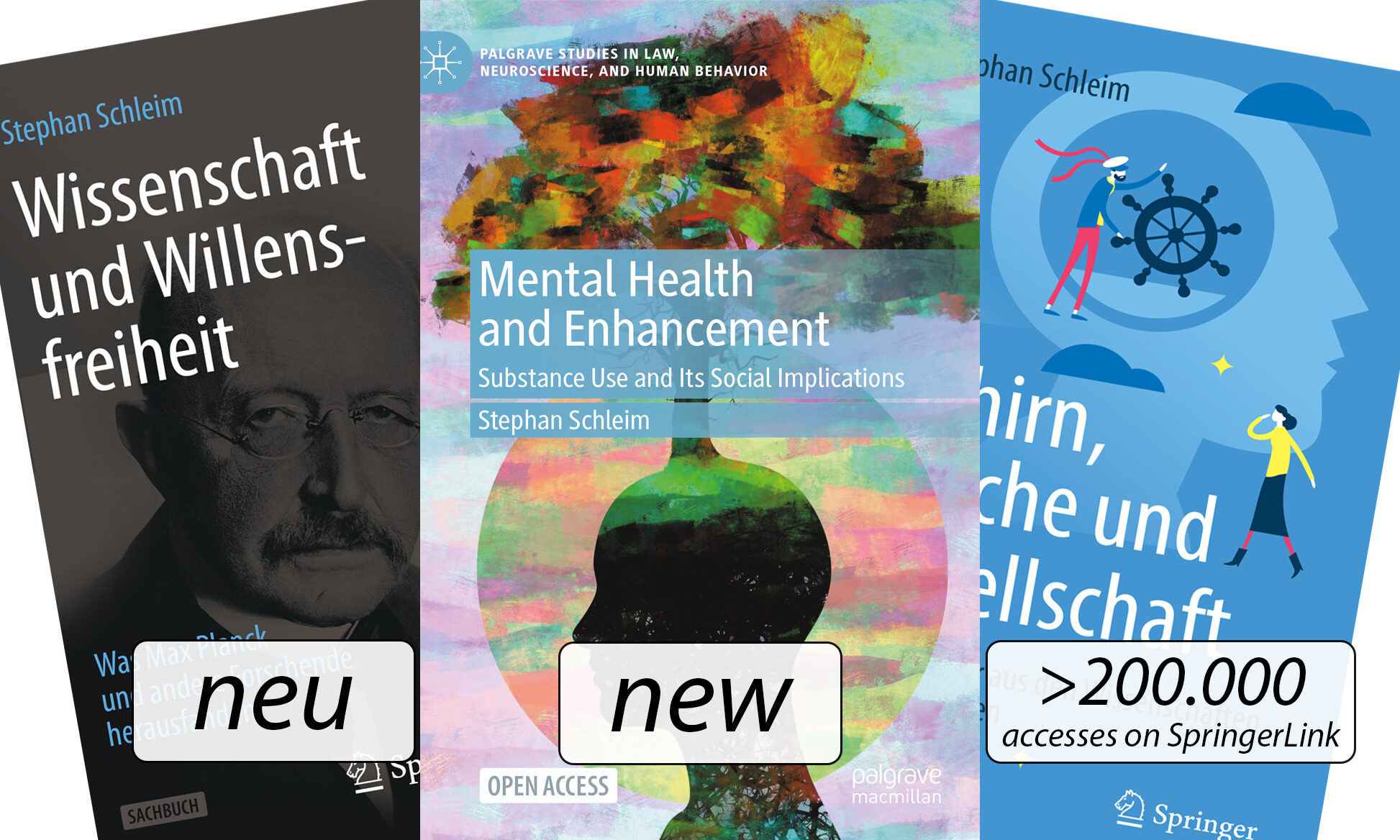Een korte samenvatting van Stephan Schleims onderzoeksprojecten. (in het Engels)
The History of Neuroethics (2017-2022)
The neurosciences are said to have had a major impact on society and science at large. This research project aims at an independent assessment of that impact, focusing on the debates on cognitive enhancement, neurolaw, and psychiatric disorders. Special attention is paid to conflicts of interests which researchers in this field might have.
Publications
- Schleim, S. (2023). Mental Health and Enhancement: Substance Use and Its Social Implications. London: Palgrave Macmillan.
- Schleim, S. (2022). Why Mental Disorders Are Brain Disorders. And Why They Are Not: ADHD and the Challenges of Heterogeneity and Reification. Frontiers in Psychiatry, 13, 943049.
- Schleim, S. (2022). Stable Consciousness? The “Hard Problem” Historically Reconstructed and in Perspective of Neurophenomenological Research on Meditation. Frontiers in Psychology, 13, 914322.
- Schleim, S. (2022). Neuroscience Education Begins With Good Science: Communication About Phineas Gage (1823–1860), One of Neurology’s Most-Famous Patients, in Scientific Articles. Frontiers in Human Neuroscience, 16, 734174.
- Schleim, S. (2022). Pharmakologische Verbesserung des Menschen: Fakten und Mythen über Gehirndoping. Theory and History of Psychology, University of Groningen.
- Schleim, S. (2022). Pharmacological Enhancement: The Facts and Myths About Brain Doping.
- Schleim, S. (2022). Farmacologische verbetering van de mens: Feiten en mythen over breindoping.
- Schleim, S. (2022). Grounded in Biology: Why the Context-Dependency of Psychedelic Drug Effects Means Opportunities, Not Problems for Anthropology and Pharmacology. Frontiers in Psychiatry, 13, 906487.
- Schleim, S. (2021). Neurorights in History: A Contemporary Review of José M. R. Delgado’s “Physical Control of the Mind” (1969) and Elliot S. Valenstein’s “Brain Control” (1973). Frontiers in Human Neuroscience, 15, 703308, 1-7.
- Schleim, S. (2020). Neuroenhancement as Instrumental Drug Use: Putting the Debate in a Different Frame. Frontiers in Psychiatry, 11, 567497, 1-5.
- Schleim, S. (2020). Real Neurolaw in the Netherlands: The Role of the Developing Brain in the New Adolescent Criminal Law. Frontiers in Psychology, 11, 1762, 1-5.
- Schleim, S. (2020). To Overcome Psychiatric Patients’ Mind–Brain Dualism, Reifying the Mind Won’t Help. Frontiers in Psychiatry, 11, 605, 1-4.
- Schleim, S. (2020). Gedankenlesen. Fiktion oder Zukunftstechnologie? [Mind Reading. Fiction or Future Technology?] In: M. Spitzer & W. Bertram (eds.), Hirngespinste: Die besten Geschichten über unser wichtigstes Organ, pp. 279-299. Schattauer, Stuttgart.
- Schleim, S. (2019). ‘Neurorecht’ in Nederland: De motivering van het nieuwe adolescentenstrafrecht vanuit een neurofilosofisch perspectief. Algemeen Nederlands Tijdschrift voor Wijsbegeerte, 111, 379-404.
- Schleim, S. (2018). Subjective Experience, Heterophenomenology, or Neuroimaging? A Perspective on the Meaning and Application of Mental Disorder Terms, in Particular Major Depressive Disorder. Frontiers in Psychology, 9, 702.
- Schleim, S. & Quednow, B.B. (2018). How realistic are the scientific assumptions of the neuroenhancement debate? Assessing the pharmacological optimism and neuroenhancement prevalence hypotheses. Frontiers in Pharmacology, 9, 3.
- Schleim, S. (2018). Medikamente und Drogen im Wandel gesellschaftlicher Erwartungen. In: Mercer, M. (ed.), altered states. Substanzen in der zeitgenössischen Kunst, pp. 292-303. Kunstpalais Erlangen.
- English translation: Medications and Drugs as Social Expectations Change. In: Mercer, M. (ed.), altered states. Substances in Contemporary Art, pp. 292-303. Kunstpalais Erlangen.
- Schleim, S. (2018). Enhancement – een probleem van betekenis voor de neuro-ethiek? [Enhancement – a meaningful problem for neuroethics?]. In: D. Stemerding & R. Edelenbosch (eds.), Podium voor Bio-ethiek, 24, 12-15.
- Schleim, S. & Quednow, B. (2017). Debunking the ethical neuroenhancement debate. In: R. Ter Meulen, A. D. Mohamed & W. Hall (eds.), Rethinking Cognitive Enhancement, pp. 164-175. Oxford University Press, Oxford.
Funded by the Dutch Research Foundation (NWO; EUR 250,000; PI: S. Schleim)
Intuition and Emotion in Moral Decision-Making (2010-2016)
In collaboration with Birte Englich (social psychology, University of Cologne) and Guy Kahane (philosophy, Oxford University) I investigated the history, psychological, and philosophical aspects in the recent research on moral decision-making. We published more than 60 articles in peer reviewed journals and book chapters and supervised two dissertations. The dissertation by Felix Schirmann (“The Good, the Bad, and the Brain: Theory and History of the Neuroscience of Morality”) written under my supervision was awarded the Praemium Erasmianum dissertation award in 2015.
Publications (selection)
- Schleim, S. (2015). The half-life of the moral dilemma task – a case study in experimental (neuro-) philosophy. In: J. Clausen & N. Levy (eds.), Handbook of Neuroethics, pp. 185-199. Springer, Berlin.
- Schleim, S. (2015). How Empathy Became a Brain Function: A Neurophilosophical Case Study. Philosophy, Theology and the Sciences (Special Issue on Empathy), 2, 41-62.
- Schleim, S. (2015). Auf der Suche nach der letzten Moral. Hirnforschung auf dem Weg von der helfenden Hand zur moralischen Autorität. Concilium, 51(4), 423-434.
- English translation: Looking for the Basis of Morality: Brain Research moves from Helping Hand to Moral Authority. Concilium, 51(4), 49-62.
- Schleim, S. (2015). Bildgebende Verfahren der Neurowissenschaften in der strafrechtlichen Ermittlungspraxis: Eine kritische Perspektive auf den Stand der Forschung. [Neuroimaging in Penal Examinations: A Critical Perspective on the State of the Art.], pp. 369-388. In: S. Barton, R. Kölbel & M. Lindemann (eds.), Wider die wildwüchsige Entwicklung des Ermittlungsverdahrens [Against the Uncontrolled Growth in the Preliminary Proceedings]. Nomos, Baden-Baden.
- Schirmann, F. (2014). “The wondrous eyes of a new technology”—a history of the early electroencephalography (EEG) of psychopathy, delinquency, and immorality. Frontiers in Human Neuroscience (Research Topic: Critical Neuroscience), 8, 232.
- Schirmann, F. (2014). The neuropathology of morality: Germany 1930 – 1960. Journal of the History of the Neurosciences, 23(1), 56-74.
- Schirmann, F. & Schleim, S. (2014). The Anatomy of Violence: The Biological Roots of Crime. Theoretical Criminology, 18, 576-578.
- Schleim, S. (2014). Critical Neuroscience – or Critical Science? A Perspective on the Perceived Normative Significance of Neuroscience. Frontiers in Human Neuroscience (Research Topic: Critical Neuroscience), 8, 336.
- Schleim, S. (2014). Turning our attention to the neuroscience turn. BioSocieties, 9, 354-359.
- Schirmann, F. (2013). Badness, madness and the brain – the late 19th-century controversy on immoral persons and their malfunctioning brains. History of the Human Sciences, 26(2), 33-50.
- Schirmann, F. (2013). Invoking the brain in studying morality: A theoretical and historical perspective on the neuroscience of morality. Theory & Psychology, 23(3), 289-304.
- Schleim, S. (2012a). Brains in Context in the Neurolaw Debate: The Examples of Free Will and “Dangerous” Brains. International Journal for Law and Psychiatry, 35, 104-111.
- Schleim S., Spranger T. M., Erk, S. & Walter, H. (2011). From moral to legal judgment: The influence of normative context in lawyers and other academics. Social Cognitive and Affective Neuroscience, 6, 48-57.
- Schleim, S. (2011). Über einen möglichen normativen Beitrag der Moralphysiologie [On a possible normative contribution of moral physiology]. In: G. Scharifi (ed.) Brauchen wir eine neue Ethik? Herausforderungen der Moral durch die Neurowissenschaft, pp. 181-198. [Do we need a new ethics? Neuroscientific challenges of morals] mentis, Paderborn.
Funded by the VolkswagenFoundation (ca. EUR 250,000; total volume >EUR 500,000; PI: S. Schleim)
Neuroscience in Context (2007-2010)
As a group of nine researchers from philosophy, the cognitive science, and the neurosciences we received funds for networking activities, to attend and organize conferences. This was a great opportunity for us PhD students and a few Postdocs to become more independent as a researcher.
Publications (selection)
- Schleim S., Spranger T. M., Erk, S. & Walter, H. (2011). From moral to legal judgment: The influence of normative context in lawyers and other academics. Social Cognitive and Affective Neuroscience, 6, 48-57.
- Schleim, S. (2010). Second thoughts on the prevalence of enhancement. BioSocieties, 5, 484-485.
- Schleim, S. (2010). Risiken und Nebenwirkungen der Enhancement-Debatte. [Risks and Side Effects of the Enhancement Debate] SuchtMagazin, 2/2010, 49-51.
- Schleim, S. & Roiser, J. P. (2009). fMRI in translation: the challenges facing real-world applications. Frontiers in Human Neuroscience, 3, 63.
- Schleim, S. (2009). The risk that neurogenetic approaches may inflate the psychiatric concept of disease and how to cope with it. Poiesis & Praxis, 6, 79-91.
- Schleim, S. (2008) The Brain on the Stand? Interactions Between Neuroscience, Ethics and Law. Journal of International Biotech Law, 5, 131-134.
- Schleim, S. (2008). Moral Physiology, Its Limitations and Philosophical Implications. Jahrbuch für Wissenschaft und Ethik, 13, 51-80.
- Schleim, S., Spranger, T. M., Urbach, H. & Walter, H. (2007). Zufallsfunde in der bildgebenden Hirnforschung. Empirische, rechtliche und ethische Aspekte. [Incidental findings in neuroimaging. Empirical, legal, and ethical aspects] Nervenheilkunde, 26, 1041-1045.
- Schleim, S., Spranger, T. M. & Walter, H. (2007). Von der Neuroethik zum Neurorecht? Der Beginn einer neuen Debatte. [From Neuroethics to Neurolaw? The beginning of a new debate] Nervenheilkunde, 26, 813-817.
- Galert, T. & Schleim, S. (2007). Eingriff ins Gehirn oder Angriff auf die psychische Integrität? [Intervening in the brain or interfering with psychic integrity?] Nervenheilkunde, 26, 618-622.
Funded by the VolkswagenFoundation (EUR 135,000; PI: Jan Slaby)





